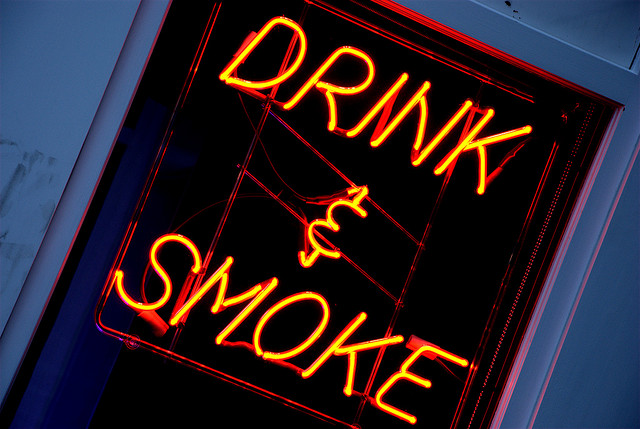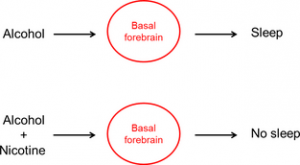Smoking Keeps You Awake When You Drink

A team of researchers from the University of Missouri has discovered that nicotine compensates the drowsiness caused by alcohol. The finding, published in the Journal of Neurochemistry, would explain why alcohol and nicotine use are linked for 85% of U.S. alcohol drinkers.
Nicotine and alcohol use go frequently together, but the causes are unknown. Some research affirms that nicotine increases the pleasurable side of drinking and lowers the disagreeable part. The authors of this study previously showed that nicotine acts in the basal forebrain to activate the nucleus accumbens and thus increase alcohol use. Combined use of alcohol and nicotine caused increased pleasure in the brain’s reward center, which in turn leads to drinking more. More recently, they developed a hypothesis according to which nicotine would act via the basal forebrain to counteract the tiredness and sleepiness experienced when drinking alcohol, which also acts in the basal forebrain. Acetylcholine, a neurotransmitter that promotes wakefulness, is produced in this region. When properly stimulated, the basal forebrain releases acetylcholine and promotes wakefulness and REM sleep, whereas inhibiting its releases causes slow wave sleep. The authors thought that by identifying the molecular mechanisms that take place in this brain region when consuming alcohol and nicotine, new treatments could be conceived to control addiction.
Nicotine normalizes sleep-wakefulness patterns altered by alcohol
In their last study, Takkar´s team experimented with rats administered with alcohol and nicotine, and they monitored their response via sleep-recording electrodes. The statistical analysis demonstrated that the treatments had an effect on sleep-wakefulness patterns. Rats exposed only to alcohol showed strong sleep promotion. In rats pre-treated with nicotine in the basal forebrain, alcohol didn´t induce such a strong sleepiness, and sleep-wakefulness was normalized. Thus, nicotine acts on the basal forebrain, cancelling out the sleepy effects of drinking alcohol.
This study will contribute to curb alcohol and nicotine consumption, responsible for more than 7 million deaths in the US every year. the findings could also benefit those who suffer from schizophrenia, which is associated with nicotine use.
Source: U. of Missouri

